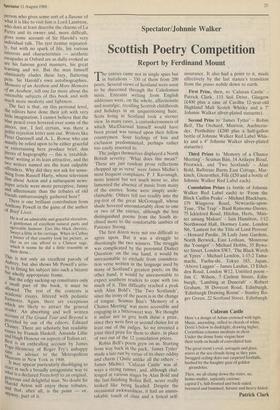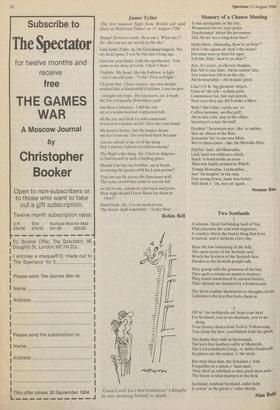Spectator/Johnnie Walker
Scottish Poetry Competition
Report by Ferdinand Mount
TMlle entries came not in single spies but in battalions – 330 of them from 200 poets. Several views of Scotland were soon to be discerned through the Caledonian mists. Entrants writing from English addresses were, on the whole, affectionate and nostalgic, recalling Scottish childhoods and holidays in an unquestioning haze. Scots living in Scotland took a sterner view. In many cases, a cantankerousness of which MacDiarmid himself would have been proud was turned upon their fellow countrymen. Sour feelings of loss and exclusion predominated, perhaps rather too easily resorted to.
The judges themselves displayed a North British severity: 'What does this mean?' 'These are just random prose reflections chopped up as verse' were James Michie's most frequent complaints. P. J. Kavanagh, more lenient but not much more so, also lamented the absence of music from many of the entries. Some were simply unde- claimable. Others fell too readily into the jog-trot of the great McGonagall, whose shade hovered uncomfortably close to one or two of the entries, although the less distinguished poems from the South in- clined more to the comfortable iambics of Patience Strong.
The first dozen were not too difficult to agree upon. But it was a struggle to disentangle the two winners. The struggle was complicated by the perennial Dialect Question: on the one hand, it would be unreasonable to exclude from considera- tion verse written in the language used by many of Scotland's greatest poets; on the other hand, it would be unreasonable to expect southern readers to cope with too much of it. This difficulty reached a peak with Alan Bold's 'The Two Scotlands', since the irony of the poem is in the change of tongue. Seumas Ban's 'Memory of a Chance Meeting' was more accessible and engaging in a bittersweet way. We thought it unfair not to give both these a prize, since they were first or second choice for at least one of the judges. So we invented a joint third prize for them to share, in place of two out of the 12 consolation prizes.
Robin Bell's poem grew on us. Starting from way back in the pack, 'James Tytler' made a late run by virtue of its sheer oddity and charm ('Quite unlike all the others' James Michie). 'Culzean Castle' was al- ways a strong runner, and, although chal- lenged at various stages by Alan Bold and the fast-finishing Robin Bell, never really looked like being headed. Despite the occasional awkwardness, it had an unmis- takable touch of class and a lyrical self- assurance. It also had a point to it, made effectively by the last stanza's transition from the piano nobile down to earth.
First Prize, then, to 'Culzean Castle' Patrick Clark, 115 Seil Drive, Glasgow (£400 plus a case of Cardhu 12-year-old Highland Malt Scotch Whisky and a 7" Johnnie Walker silver-plated statuette).
Second Prize to 'James Tytler' – Robin Bell, The Orchard, Muirton, Auchterar- der, Perthshire (f200 plus a half-gallon bottle of Johnnie Walker Red Label Whis- ky and a 4" Johnnie Walker silver-plated statuette).
Third Prizes to 'Memory of a Chance Meeting' – Seumas Ban, 14 Ardayre Road, Prestwick, and 'Two Scotlands' – Alan Bold, Balbirnie Burns East Cottage, Mar- kinch, Glenrothes, Fife (£50 and a bottle of Johnnie Walker Red Label each).
Consolation Prizes (a bottle of Johnnie Walker Red Label each) to 'From the Black Cuillin Peaks' – Michael Blackburn, 179 Wingrove Road, Newcastle-upon- Tyne, 'The Trap' – Basil Ransome-Davies, 75 Ickleford Road, Hitchin, Herts, 'Mais- ter amang Makars' – lain Hamilton, 1/12 Northwood Hall, Hornsey Lane, London N6, 'Lament for the Title of Lord Provost' – Howard Purdie, 38 Lady Jane Gardens, North Berwick, East Lothian, 'Montrose the Younger' – Michael Hobbs, 35 Bywa- ter Street, London SW3, 'The Black Watch at Ypres' – Michael Lendon, 1-15-2 Tama- machi, Fuchu-shi, Tokyo 183, Japan, 'Above Laggan' – James Lasdun, 13 Ethel- den Road, London W12, Untitled poem Jim C. Wilson, 7 Carlton Street, Edin- burgh, 'Lambing at Duncrub' – Robert Graham, 38 Dovecot Road, Edinburgh, 'Edinburgh Drawing Room' – Stanley Ro- ger Green, 22 Scotland Street, Edinburgh.
Culzean Castle
Here's a design of Adam crowned with light. Music, ascending, stilled to chords of white. Doric's below in dusklight; drawing higher, Corinthian columns meditate in choir. Under the dome Ionic virgins bear their truth on heads of convoluted hair.
The great room's oval, astragals and glass, stares at the sea-clouds dying as they pass. Swagged ceiling skies our carpeted footfalls, hushed by the haughty gaze of golden girandoles.
Then, we all clump down the stairs, us; homo-mulier, sapiently curious; capital I's, full-fronted and back-sided, breasted and bummed, hirsute and heavy-hided.
Patrick Clark James Tytler
The first manned flight from British soil took place at Holyrood Palace on 15 August 1784.
Bump! Down to earth. Here am I. What am I? Sir, did you see me nearly in the sky?
I am James Tytler, sir, the Greenland surgeon. No; my head spins; I was he but that's long ago.
Give me your hand. I am the apothecary. You came to my shop in Leith. I flew! I flew!
I babble. My head, like my balloon, is light — see I can still joke. 'Tytler: First in Flight': I'll print that. I have a press, my own design, worked like a blacksmith's bellows. I use no pen — straight into type. Do you know, sir, / made the Encyclopaedia Britannica, paid less than a labourer. I did the job sat at a washerwoman's upturned tub, all the pay and desk I could command: seven new volumes so far. Give me your hand.
My head is better, but the basket draws my feet from me. Do you hold back because you are afraid of me or of the dung that I and my balloon are fallen among?
The flight's the thing. Sir, I feel no disgrace to find myself in such a landing place.
Should I be like my brother, sat at home favouring the gentry with his Latin poems?
You saw me fly across the Sanctuary wall. The cynic crowd that came to see me fall or fail to rise, stands at your back and jeers. How high should I have flown for them to cheer?
Stand back, Sir, I've no need of you. The future shall remember — Tytler flew!
Robin Bell
'Good Lord! Isn't that Jenkinson? I thought j he was drinking himself to death.'
Memory of a Chance Meeting
It was springtime in the city, Wannered oot wi' easy grace, Daydreamin' aboot the pavement, Did Ah no' see a long-kent face?
Hallo there, Hiawatha, how're ye livin'? How's the squaw an' how's the wean'? Havenae seen ye here for ages.
Tell me, fella', how're ye dain'?
Aye. it's years, ya cheerie chappie, But Ah've nae time, Ah'm runnin' late, Ten years noo Ah'm in the city, Ah'm miserable — Ah'm dain' great.
Caur's O.K. big gleamin' object, Goes wi' the job— a shiny perk, Commission tae, fair eats petrol, Next year they say Ah'll make a Merc.
Wife? She's fine, rarely see 'er, Coffee mornins, aw that guff, Ah'm late a lot, stay at the office, Secretary's a nice bit stuff.
Dochter? Seventeen noo, like 'er mither, Skis an' discos at the Ritz, Screamin' for 'er ain wee Mini, We've three caurs — like the Melville-Pitts.
Did for 'issel, did Hiawatha, Laid 'issel oot withoot a stitch, Stuck 'is heid inside an oven That was highly praised in Which. Young Hiawatha, I remember, Saw 'im laughin' in the rain, Fine young brave, nane was better, Still think o"im, noo an' again.
Seumas Ban
Two Scotlands
1 A solemn, bleak forbidding land of Nay That saturates the soul with negatives. A country where the lonely thing that lives Is hatred, and it darkens every day.
Hear the low lamenting of the folk, The open secret of the Scottish race; Watch the features of the Scottish face Harden as the Scottish people talk.
They gossip with the grimness of the lost, Their guilt contains no massive mystery: They stand condemned by ancient history, Their dreams are haunted by a broken past.
The Scots confine themselves to thoughts of sin, Culloden is the key that locks them in.
2 Off wi' the molligrubs an' hoist your heid For Scotland, you're no doutsum, you're no draig.
Your beauty shines from Yell to Yellowcraig, You climp the hert, you blithely licht the gleed.
The flashy-fiery falls at Inversnaid, The loch that louthers saftly at Menteith, The Corrieshalloch Gorge, or duthe Dunbeath: Sic places are the makin' o' the steid.
But mair than that, the ferkishin o' folk Forgaither in a union o' faun sauls. They shelf as rabblach as they pack their awls, The future is what maitters to the feck.
Scotland, rambust Scotland, caller licht Is comin' in the gleen o' caller thocht.
Alan Bold







































 Previous page
Previous page